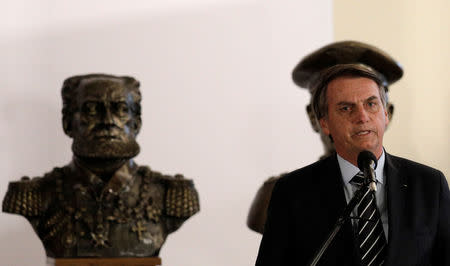Bolsonaro presidential decree grants sweeping powers over NGOs in Brazil

By Gabriel Stargardter
RIO DE JANEIRO (Reuters) - Brazil's new President Jair Bolsonaro has used an executive order to give his government secretary potentially far-reaching and restrictive powers over non-governmental organizations working in Brazil.
The temporary decree, which will expire unless it is ratified within 120 days by Congress, mandates that the office of the Government Secretary, Carlos Alberto Dos Santos Cruz, "supervise, coordinate, monitor and accompany the activities and actions of international organizations and non-governmental organizations in the national territory."
The order, signed late on Tuesday, is part of a raft of measures the far-right Bolsonaro administration implemented on its first day in power.
Jose Miguel Vivanco, director of the Americas division of Human Rights Watch, said the decree on NGOs could be viewed in a positive light, but also expressed concerns.
"If the purpose of the measure were to facilitate a constructive relationship between international civil society groups and the government at its highest level, it would be a welcome step," he said.
"However, what strikes me is the use of the terms 'supervise' and 'monitor', which suggest a fundamental lack of understanding of the independent role that these entities play in any open and democratic society."
The decree did not give reasons for the change, but Bolsonaro said on Twitter that NGOs had "exploited and manipulated" the country's indigenous population of about 900,000.
"Let us together integrate these citizens and value all Brazilians," he wrote.
The president's office did not immediately respond to a request for comment.
Bolsonaro is a former army captain and his cabinet is full of former high-ranking military officials - including Santos Cruz, a retired general.
Brazil's military has long considered that the rich resources of the vast, sparsely-populated Amazon should be protected from any foreign interest.
Environmental and rights groups were already upset by the new government's decision to give the agriculture ministry power over indigenous land rights decisions, and the latest move risks causing further tension with such groups.
A longtime member of Congress, Bolsonaro said at his inauguration on Tuesday that his election had freed the country from "socialism and political correctness."
(Reporting by Gabriel Stargardter, additional reporting by Brad Brooks, editing by Rosalba O'Brien)

